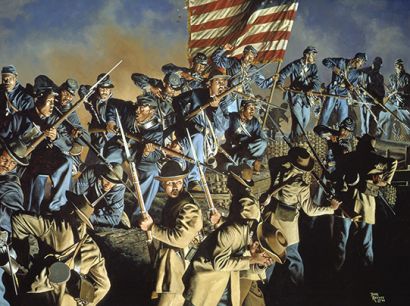This Week's Story
The superb performance and skills of the 54th Massachusetts Volunteer Military Regiment far exceeded profiling of black soldiers.

This Week’s Story relives American history and the Bible through brief inspiring stories presented on mp3 audio recordings and text for reading.
Civil War: Profiling and Reality Clash! part two
One thousand black soldiers marched through Boston’s narrow streets May 28, 1863. With the regiment were twenty-nine white officers. Police hid nearby in case rioting began.
All the blacks were volunteers! All had enemies and supporters! They were being allowed to form the first black Union military group with full government approval. They would serve on the Union side in the Civil War. Their right had not come easily.
In the South no blacks were combat soldiers in the Confederate Army. They could help as cooks, teamsters, or manual laborers, but not as enlisted soldiers.
As the soldiers marched, friends and families cheered and waved flags from balconies. Parents, sweethearts, wives, and children watched along the streets. Some ran beside the troops. Soon the crowd and soldiers reached the famous Boston Commons, America’s oldest public park. The governor and his staff reviewed the regiment. By 4:00 P.M. the regiment’s men, horses, and guns were on a boat to South Carolina and war.
America’s famous poet, Henry Wadsworth Longfellow wrote, “{I} saw the first regiment of blacks march through Beacon Street. An imposing sight, with something wild and strange about it, like a dream. At last the North consents to let the Negro fight for freedom.”
On January 1, 1863 President Lincoln had issued his final version of the Emancipation Proclamation. Black men could now enlist in the Union Army. By January 26th steps had begun for the formation of the 54th Regiment. The first man to join was 25-year-old Captain Shaw. After being asked to command the unit, Shaw wrote a letter refusing the assignment. The next day, he requested that his letter be destroyed. He would accept the position.
Recruitment began. The Union needed more soldiers. Many people against slavery thought that the black soldiers would prove their bravery and help end slavery.
In less than three months, despite much opposition, 1000 black men had volunteered. They were an outstanding group. The 54th Massachusetts Volunteer Infantry Regiment broke the profile many people in the United States had of blacks.
The blacks came from 22 states. Only a few had ever been slaves. They knew that if they were captured, they risked death or being sold into slavery. The educational level was higher in the 54th than in many white regiments. There was no problem finding men to handle jobs requiring reading and writing.
The officers were hand-picked. They were to have high character and positive feelings towards black people. Most were from well-known families against slavery and called abolitionists.
Governor Andrew tried hard to get the War Department to commission black officers. His attempt failed.
The behavior of the 54th regiment surprised many observers. The sanitation in many white regiments was filthy as reported by the U.S. Sanitary Commission. More Union soldiers died of diarrhea and disease during the Civil War than were killed in combat. The United States Surgeon General Dale reported cleanliness and less drunkenness in the 54th.
Soon we visit the heroic assault upon Battery Wagner that made the 54th famous.
This is Scott Thomas for Barbara Steiner bringing you “Civil War: Profiling and Reality Clash.” Visit thisweeksstory.com
<< previous story] [next story >>
We invite your comments! [click here to comment]
From Barbara
I am grateful that my grandmother Nonnie and parents lived fairness, respect, and sensitivity to all ethnicities. They were part of the friends we had and how we shared skills with each other.
Response by Elizabeth at This Week's Story
You learned loving your neighbor as yourself.
This Week's Story is a non-profit supported by listeners. [click here to make a donation]
 click here to play audio
click here to play audio